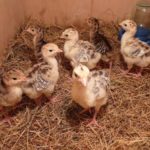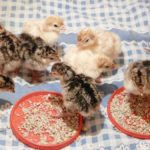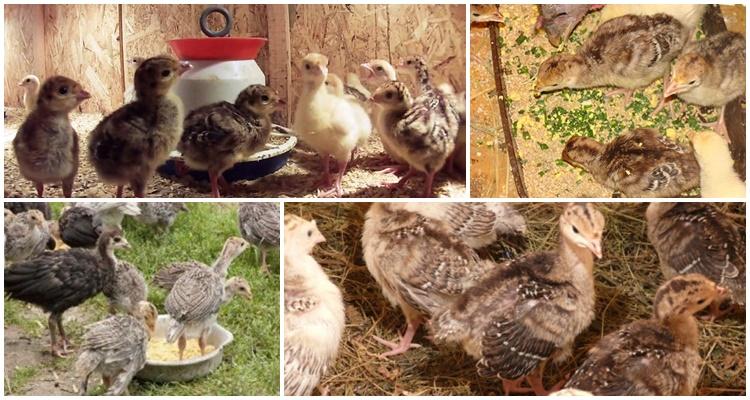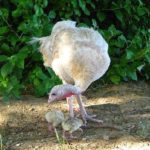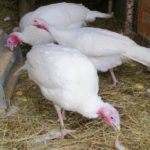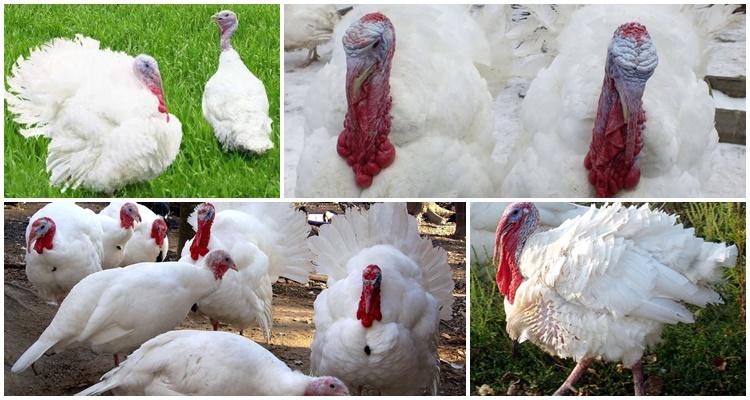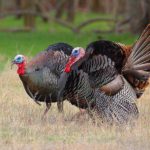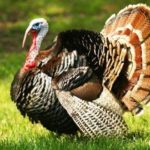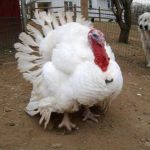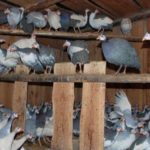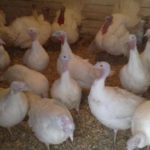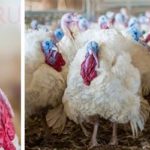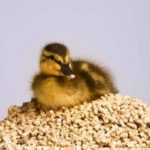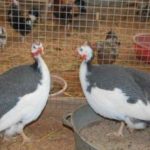Raising turkeys on private farms begins with raising young animals from day-old chicks. By 4-5 months they have grown so much that they can be sent for slaughter or selected from the breeding stock. Let's consider what to feed small turkey poults in the first days of life at home, as well as up to 5 months of age, drawing up the correct diet and feeding regimen.
- Feeding turkey poults from the first days of life at home
- Day old birds
- Week old chicks
- What to give at 2 weeks of age
- Monthly turkey poults
- Two month old birds
- What to give at 3 months
- What to feed at 4 months
- Specifics of feeding broiler turkeys for beginners
- Features of the use of vitamin and mineral supplements in the diet
- What is forbidden to give?
Feeding turkey poults from the first days of life at home
Turkey poults of any breed are demanding of feed, its composition, consistency, and feeding regimen. Errors in feeding often lead to deterioration in the health and death of chicks.
Day old birds
In the first day after hatching, turkey poults may not show appetite, since they have not yet used up all the nutrients in the eggs. If they are in no hurry to eat, there is no need to force feed them. But it is necessary to water, so you need to put a drinking bowl with water in the brooder for the chicks. If you have an appetite, then the turkey menu consists of a mixture of boiled eggs, low-fat, non-sour cottage cheese and fresh herbs. Feeding frequency – 5-6 times a day.
Week old chicks
For the first week, small turkey poults are fed the same mixture as the first day, but on the 3-4th day they add fine chaff or millet, a little meat and bone meal, onions, and grass. Greens are a source of vitamins vital for the growth and development of chicks. Onion mixtures should be given during the day, not in the evening. After eating it at night, the turkey poults will be thirsty. This will make them worry, crowd together and push each other.
You need to take young, soft grass, which still has little fiber. A large amount of fiber poses a danger to the bird’s still weak digestive tract. The ratio of components is 4 to 1. Newly hatched turkeys have soft beaks, so in the first days the food is poured not into a feeder, but onto a sheet of paper.
Place warm water in a drinking bowl in the brooder; it can be sweetened. The drinking bowl should be shallow so that the chicks cannot climb into it with their feet and do not overfill the water. Wet turkey poults can get sick and die.You can pour yogurt into another drinking bowl; turkey poults digest it well. But you need to make sure that the dairy product does not turn sour.
Some poultry farmers feed small turkeys with chick feed from the very first days. Many enterprises issue starter feed for turkey poults. You need to choose only high-quality mixtures, even if they are not cheap. It is also important to pay attention to the freshness of the food. No more than a month must pass from the release date. You should not take old feed that is past its expiration date.
What to give at 2 weeks of age
It is recommended to feed 2-week-old turkey poults a mash of 50% crushed grain, 20% peas, 25% sunflower meal and 5% chalk. They still give fresh cottage cheese, yogurt, buttermilk, and skim milk, but their volume is gradually reduced. At 2 weeks you can give boiled potatoes in mixtures, 5-6 g per chick per day. Mineral additives include salt and crushed eggshells.
The consistency of the mash should be moderate; prepare the mixture not dry, but not wet either, so that it does not pour down the throat of the turkey poults. After each feeding, the feeders are cleaned and washed.
Monthly turkey poults
The composition of wet mashes is changed, more protein feeds are introduced into them, both plant and animal origin: waste from meat and fish production. The amount of boiled potatoes can be doubled. When turkey poults are already 1.5 months old, they can begin to be fed whole grains. By 2 months, its share can be increased to 50% of the total amount of grain food. Green grass, nettles, tops, dandelion, and onion are added to the mixture.
Turkey poults are fed with mixed feed.It is important to note that only poultry feed can be given; pork and cattle are not suitable, they contain more salt and dietary fiber.
Two month old birds
At 2 months, turkey poults receive food 4 times a day. They are fed with mash or ready-made mixed feed. Bread and kitchen scraps can be added to the mixtures. By this time, they switch to complete mixtures, which contain all the nutrients necessary for the bird’s body. To prevent diseases, once a week you need to add several crystals of potassium permanganate to drinking water, and crushed pine needles to the food.
In summer, 2-month-old turkey poults can be grazed on grass or walked in a pen so that they can breathe fresh air and accumulate vitamin D.
What to give at 3 months
The composition of food for three-month-old chicks remains the same, but its volume increases. The amount of food that turkeys should receive is calculated based on the amount they absorb within half an hour. Any uneaten remains should be removed from the feeders.
What to feed at 4 months
The basis of the diet of 4-month-old turkeys is grain mash. Any suitable food is placed in them; at this age, the bird’s digestive tract digests whole grains, foods containing fiber and other heavy foods. In the pen, turkeys can find insects, earthworms, and larvae. From spring to autumn, you can prepare brooms from branches of linden, birch, poplar, and herbs. They are dried in the shade and stored in a dry, dark room. During the winter, crumbled leaves and herbs are added to the mash as a vitamin supplement.
Specifics of feeding broiler turkeys for beginners
Broilers fatten quickly and have an intense metabolism. It is recommended to feed them with commercially produced feed.You need to choose a quality product, even if it is expensive. The costs will pay off in the future. It is allowed to use only poultry feed, never pork or cow feed. They have a different composition that is not suitable for the bird’s body.
Self-prepared food can consist of grains from different crops, crushed or whole. Other ingredients: meal, bran, yeast, meat and bone meal, chalk, salt. Homemade compound feed is cheaper, but you need to prepare it in small portions so as not to store it. If it is damp, sour, or covered with mold spots, you cannot feed it.
Features of the use of vitamin and mineral supplements in the diet
On the market you can buy various preparations specially designed and produced for feeding poultry. The complexes strengthen and support the body’s immune forces, provide the daily requirement of turkey poults for the main vitamin and mineral components. Birds receiving the complexes grow better, do not get sick, and do not die.
The dosage is chosen according to the instructions, which indicate the norm for turkey poults depending on age and gender. It cannot be exceeded; an excess of vitamins and minerals is just as harmful as a deficiency.
What is forbidden to give?
Turkeys are not omnivores, and there are foods that will be harmful to them. Feeding such food will lead to disorders, diseases and complications. For example, you cannot give birds compound feed for farm animals - pigs, cows. Due to inappropriate composition, they can cause diseases and disorders of the gastrointestinal tract and liver.
Fresh bread, white bread and bakery products should not be given. It is prohibited to feed spoiled, raw, moldy, or expired products. Bad products can be recognized by their smell and must be disposed of.It is also not allowed to feed raw meat and fish; they may contain helminth larvae or eggs. In addition, fish contains small bones that can be used by birds to choke. Also, you should not feed foods that are too salty, spicy, or pickled. When harvesting grass, you need to be careful not to come across poisonous plants.
Feeding purebred turkeys and broilers need to be organized according to the rules. You need to take a particularly responsible approach to feeding small turkey poults up to the age of one month, when mortality often occurs, including due to errors made when preparing the diet. If you approach the matter wisely, you will be able to feed the bird without loss and make a profit from maintaining a home turkey farm.

